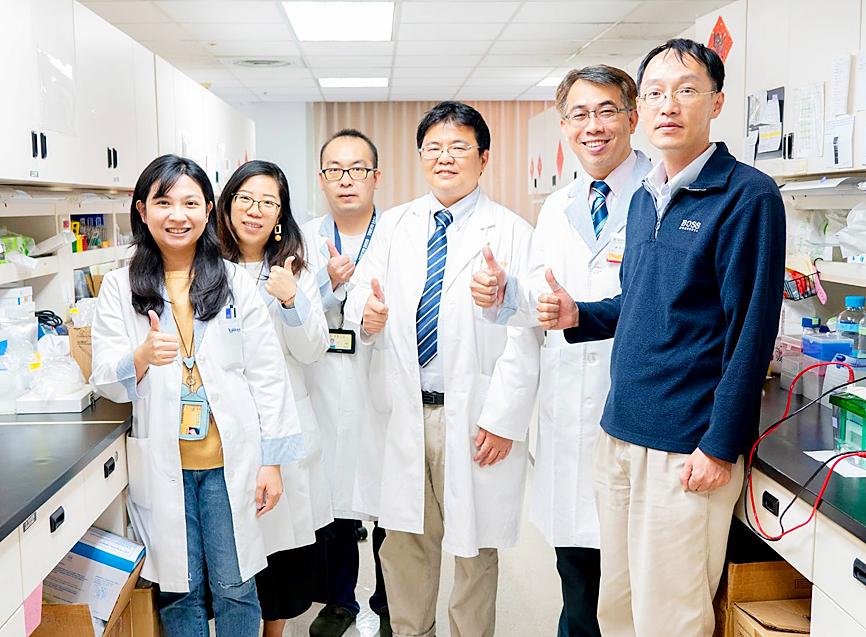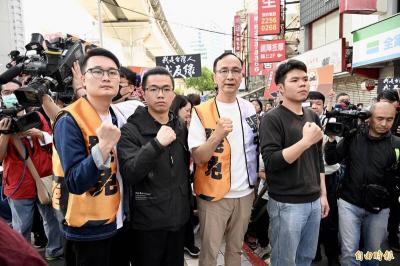Researchers have identified an antioxidant in locally grown black tea leaves as a potential inhibitor of protease activity in SARS-CoV-2, the virus that causes COVID-19, Chiayi Chang Gung Memorial Hospital said on Wednesday.
A research team led by Wu Ching-yuan (吳清源), head of the hospital’s Department of Traditional Chinese Medicine, used a computer program to identify potential antiviral components in traditional plants, the hospital said in a statement.
Theaflavin, a polyphenolic compound, shows broad-spectrum antiviral activity against several viruses and could be used as a lead compound for the development of a SARS-CoV-2 inhibitor to target the DNA-directed ribonucleic acid (RNA) polymerase (RdRp) enzyme.

Photo copied by Lin I-chang, Taipei Times
In coronaviruses, RdRp catalyzes the replication of RNA from a template, making it an attractive candidate to help develop a treatment, Wu said.
RdRp in SARS-CoV-2 is also a primary target for the antiviral remdesivir, which the WHO has called the most promising drug available for the treatment of COVID-19, he said.
Remdesivir works by inhibiting RdRp, which many RNA viruses — including coronaviruses — use to replicate themselves.
The antiviral effects of theaflavin are similar to those of remdesivir, Wu said.
However, the exact in vivo effect is still unclear, and further research is needed to confirm the mechanism whereby theaflavin targets SARS-CoV-2, Wu said.
The findings were published by the American Society for Microbiology in the Journal of Medical Virology on March 13, the hospital said.
In other news, the Central Epidemic Command Center (CECC) on Thursday said that quinoline antimalarial drugs, which have been discussed as a possible treatment for COVID-19, are produced in Taiwan and could be made available if testing proves them to be effective against the novel coronavirus.
In a small French study, doctors used a drug in the quinoline family — hydroxychloroquine — to reduce the duration and severity of COVID-19 symptoms in people with mild cases, said Chang Shan-chwen (張上淳), convener of the center’s expert advisory panel.
If properly tested and approved, a process that normally takes 12 to 18 months, the drug could conceivably reduce the burden on medical resources such as quarantine facilities, Chang said.
Minister of Health and Welfare Chen Shih-chung (陳時中), who heads the CECC, said that there is one manufacturer of quinoline drugs in Taiwan.
If the treatment were proved to be viable, the government’s first priority would be to guarantee domestic supply, Chen said.
The government could participate in the distribution of the drug on the precondition of not harming the manufacturer’s commercial interests, Chen said.
Internationally, drug distribution rights could be used diplomatically to build ties with international partners to address shortages amid the pandemic, he said.
Drugs that have been touted as potentially effective against COVID-19 have become the subject of heated competition in the past few weeks as governments scramble to combat the disease.
Remdesivir is being used on a trial basis in Taiwan and has reduced fevers in the three COVID-19 patients who have been treated with it, although its effect on overall recovery time is still being studied, Chang said.

The Ministry of Economic Affairs has fined Taobao NT$1.2 million (US$36,900) for advertisements that exceeded its approved business scope and ordered the Chinese e-commerce platform to make corrections in the first half of this year or its license would be revoked. Lawmakers have called for stricter supervision of Chinese e-commerce platforms and more stringent measures to prevent China from laundering its goods through Taiwan as US President Donald Trump’s administration cracks down on origin laundering. The legislature’s Finance Committee yesterday met to discuss policies to prevent China from dumping goods in Taiwan, inviting government agencies to report on the matter. Democratic Progressive Party

Taiwan and its Pacific ally Tuvalu on Tuesday signed two accords aimed at facilitating bilateral cooperation on labor affairs, according to Taiwan’s Ministry of Foreign Affairs (MOFA). The governments inked two agreements in Taipei, witnessed by Foreign Minister Lin Chia-lung (林佳龍) and visiting Deputy Tuvaluan Prime Minister Panapasi Nelesone, MOFA said in a news release. According to MOFA, the agreements will facilitate cooperation on labor issues and allow the two sides to mutually recognize seafarers’ certificates and related training. Taiwan would also continue to collaborate with Tuvalu across various fields to promote economic prosperity as well as the well-being of their

The Taipei District Prosecutors’ Office has continued its investigation into allegations of forged signatures in recall efforts today by searching the Chinese Nationalist Party’s (KMT) city chapter and questioning several personnel including the chapter director, according to media reports. Among those questioned and detained were KMT Taipei chapter director Huang Lu Chin-ju (黃呂錦茹), chapter secretary-general Chu Wen-ching (初文卿), chapter secretary Yao Fu-wen (姚富文) and first district committee executive director Tseng Fan-chuan (曾繁川). Prosecutors said they would not confirm reports about who had been summoned. The investigation centers on allegations that the ongoing recall campaigns targeting Democratic Progressive Party legislators Rosalia Wu (吳思瑤)

Several Chinese Nationalist Party (KMT) officials including Chairman Eric Chu (朱立倫) are to be summoned for questioning and then transferred to prosecutors for holding an illegal assembly in Taipei last night, the Taipei Police said today. Chu and two others hosted an illegal assembly and are to be requested to explain their actions, the Taipei City Police Department's Zhongzheng (中正) First Precinct said, referring to a protest held after Huang Lu Chin-ju (黃呂錦茹), KMT Taipei's chapter director, and several other KMT staffers were questioned for alleged signature forgery in recall petitions against Democratic Progressive Party (DPP) legislators. Taipei prosecutors had filed